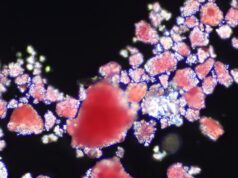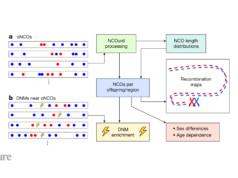Olsen, R. W. & Sieghart, W. International Union of Pharmacology. LXX. Subtypes of γ-aminobutyric acidA receptors: classification on the basis of subunit composition, pharmacology, and function. Update. Pharmacol. Rev. 60, 243–260 (2008).
Google Scholar
Sieghart, W. & Savic, M. M. International Union of Basic and Clinical Pharmacology. CVI: GABAA receptor subtype- and function-selective ligands: key issues in translation to humans. Pharmacol. Rev. 70, 836–878 (2018).
Google Scholar
Olsen, R. W. & Sieghart, W. GABAA receptors: subtypes provide diversity of function and pharmacology. Neuropharmacology 56, 141–148 (2009).
Google Scholar
Kim, J. J. & Hibbs, R. E. Direct structural insights into GABAA receptor pharmacology. Trends Biochem. Sci. 46, 502–517 (2021).
Google Scholar
Sente, A. et al. Differential assembly diversifies GABAA receptor structures and signalling. Nature 604, 190–194 (2022).
Google Scholar
Kasaragod, V. B. et al. The molecular basis of drug selectivity for alpha5 subunit-containing GABAA receptors. Nat. Struct. Mol. Biol. 30, 1936–1946 (2023).
Google Scholar
Cowgill, J. et al. Structure and dynamics of differential ligand binding in the human rho-type GABAA receptor. Neuron 111, 3450–3464.e3455 (2023).
Google Scholar
Sun, C., Zhu, H., Clark, S. & Gouaux, E. Cryo-EM structures reveal native GABAA receptor assemblies and pharmacology. Nature 622, 195–201 (2023).
Google Scholar
Nutt, D. GABAA receptors: subtypes, regional distribution, and function. J. Clin. Sleep Med. 2, S7–S11 (2006).
Google Scholar
Chuang, S. H. & Reddy, D. S. Genetic and molecular regulation of extrasynaptic GABAA receptors in the brain: therapeutic insights for epilepsy. J. Pharmacol. Exp. Ther. 364, 180–197 (2018).
Google Scholar
Sigel, E. & Steinmann, M. E. Structure, function, and modulation of GABAA receptors. J. Biol. Chem. 287, 40224–40231 (2012).
Google Scholar
Mihic, S. J. & Harris, R. A. GABA and the GABAA receptor. Alcohol Health Res, World 21, 127–131 (1997).
Google Scholar
Pirker, S., Schwarzer, C., Wieselthaler, A., Sieghart, W. & Sperk, G. GABAA receptors: immunocytochemical distribution of 13 subunits in the adult rat brain. Neuroscience 101, 815–850 (2000).
Google Scholar
Loup, F. et al. A highly sensitive immunofluorescence procedure for analyzing the subcellular distribution of GABAA receptor subunits in the human brain. J. Histochem. Cytochem. 46, 1129–1139 (1998).
Google Scholar
Sperk, G. et al. Immunohistochemical distribution of 10 GABAA receptor subunits in the forebrain of the rhesus monkey Macaca mulatta. J. Comp. Neurol. 528, 2551–2568 (2020).
Google Scholar
Stefanits, H. et al. GABAA receptor subunits in the human amygdala and hippocampus: Immunohistochemical distribution of 7 subunits. J. Comp. Neurol. 526, 324–348 (2018).
Google Scholar
Martenson, J. S., Yamasaki, T., Chaudhury, N. H., Albrecht, C. & Tomita, S. Assembly rules for GABAA receptor complexes in the brain. eLife 6, e27443 (2017).
Google Scholar
Zhang, C. et al. Neurexins physically and functionally interact with GABAA receptors. Neuron 66, 403–416 (2010).
Google Scholar
Liu, Y. T. et al. Mesophasic organization of GABAA receptors in hippocampal inhibitory synapses. Nat. Neurosci. 23, 1589–1596 (2020).
Google Scholar
Tretter, V. et al. Gephyrin, the enigmatic organizer at GABAergic synapses. Front. Cell Neurosci. 6, 23 (2012).
Google Scholar
Spencer, D. & Burchiel, K. Selective amygdalohippocampectomy. Epilepsy Res. Treat. 2012, 382095 (2012).
Google Scholar
Zhu, S. et al. Structure of a human synaptic GABAA receptor. Nature 559, 67–72 (2018).
Google Scholar
Yamasaki, T., Hoyos-Ramirez, E., Martenson, J. S., Morimoto-Tomita, M. & Tomita, S. GARLH family proteins stabilize GABAA receptors at synapses. Neuron 93, 1138–1152.e1136 (2017).
Google Scholar
Bencsits, E., Ebert, V., Tretter, V. & Sieghart, W. A significant part of native γ-aminobutyric acidA receptors containing α4 subunits do not contain γ or δ subunits. J. Biol. Chem. 274, 19613–19616 (1999).
Google Scholar
Benke, D. et al. Analysis of the presence and abundance of GABAA receptors containing two different types of α subunits in murine brain using point-mutated α subunits. J. Biol. Chem. 279, 43654–43660 (2004).
Google Scholar
Mertens, S., Benke, D. & Mohler, H. GABAA receptor populations with novel subunit combinations and drug binding profiles identified in brain by α5- and δ-subunit-specific immunopurification. J. Biol. Chem. 268, 5965–5973 (1993).
Google Scholar
Scholze, P. et al. Two distinct populations of α1α6-containing GABAA-receptors in rat cerebellum. Front. Synaptic Neurosci. 12, 591129 (2020).
Google Scholar
Zhang, S. et al. One-step construction of circularized nanodiscs using SpyCatcher–SpyTag. Nat. Commun. 12, 5451 (2021).
Google Scholar
Dalal, V. et al. Lipid nanodisc scaffold and size alter the structure of a pentameric ligand-gated ion channel. Nat. Commun. 15, 25 (2024).
Google Scholar
Engin, E., Liu, J. & Rudolph, U. alpha2-containing GABAA receptors: a target for the development of novel treatment strategies for CNS disorders. Pharmacol. Ther. 136, 142–152 (2012).
Google Scholar
Nguyen, Q. A. & Nicoll, R. A. The GABAA receptor β subunit is required for inhibitory transmission. Neuron 98, 718–725 e713 (2018).
Google Scholar
Jensen, M. L. et al. The β subunit determines the ion selectivity of the GABAA receptor. J. Biol. Chem. 277, 41438–41447 (2002).
Google Scholar
Uygun, D. S. et al. Knockdown of GABAA α3 subunits on thalamic reticular neurons enhances deep sleep in mice. Nat. Commun. 13, 2246 (2022).
Google Scholar
Dias, R. et al. Evidence for a significant role of α3-containing GABAA receptors in mediating the anxiolytic effects of benzodiazepines. J. Neurosci. 25, 10682–10688 (2005).
Google Scholar
Saras, A. et al. Histamine action on vertebrate GABAA receptors: direct channel gating and potentiation of GABA responses. J. Biol. Chem. 283, 10470–10475 (2008).
Google Scholar
Sigel, E. & Ernst, M. The benzodiazepine binding sites of GABAA receptors. Trends Pharmacol. Sci. 39, 659–671 (2018).
Google Scholar
Kim, J. J. et al. Shared structural mechanisms of general anaesthetics and benzodiazepines. Nature 585, 303–308 (2020).
Google Scholar
Masiulis, S. et al. GABAA receptor signalling mechanisms revealed by structural pharmacology. Nature 565, 454–459 (2019).
Google Scholar
Zhu, S. et al. Structural and dynamic mechanisms of GABAA receptor modulators with opposing activities. Nat. Commun. 13, 4582 (2022).
Google Scholar
Ramerstorfer, J. et al. The GABAA receptor α+β− interface: a novel target for subtype selective drugs. J. Neurosci. 31, 870–877 (2011).
Google Scholar
Varagic, Z. et al. Identification of novel positive allosteric modulators and null modulators at the GABAA receptor α+β− interface. Br. J. Pharmacol. 169, 371–383 (2013).
Google Scholar
Mortensen, M. et al. Forty Years searching for neurosteroid binding sites on GABAA receptors. Neuroscience https://doi.org/10.1016/j.neuroscience.2024.06.002 (2024).
Legesse, D. H. et al. Structural insights into opposing actions of neurosteroids on GABAA receptors. Nat. Commun. 14, 5091 (2023).
Google Scholar
Tonon, M. C. et al. Endozepines and their receptors: structure, functions and pathophysiological significance. Pharmacol. Ther. 208, 107386 (2020).
Google Scholar
Bormann, J. Electrophysiological characterization of diazepam binding inhibitor (DBI) on GABAA receptors. Neuropharmacology 30, 1387–1389 (1991).
Google Scholar
Everlien, I. et al. Diazepam binding inhibitor governs neurogenesis of excitatory and inhibitory neurons during embryonic development via GABA signaling. Neuron 110, 3139–3153.e3136 (2022).
Google Scholar
Sanchez, J. D., Gomez-Carpintero, J., Gonzalez, J. F. & Menendez, J. C. Twenty-first century antiepileptic drugs. An overview of their targets and synthetic approaches. Eur. J. Med. Chem. 272, 116476 (2024).
Google Scholar
Devenish, S. O. et al. The anticonvulsant zonisamide positively modulates recombinant and native glycine receptors at clinically relevant concentrations. Neuropharmacology 182, 108371 (2021).
Google Scholar
Liu, L. et al. The mechanism of carbamazepine aggravation of absence seizures. J. Pharmacol. Exp. Ther. 319, 790–798 (2006).
Google Scholar
Zheng, T. et al. Oxcarbazepine, not its active metabolite, potentiates GABAA activation and aggravates absence seizures. Epilepsia 50, 83–87 (2009).
Google Scholar
Hammer, H., Ebert, B., Jensen, H. S. & Jensen, A. A. Functional characterization of the 1,5-benzodiazepine clobazam and its major active metabolite N-desmethylclobazam at human GABAA receptors expressed in Xenopus laevis oocytes. PLoS ONE 10, e0120239 (2015).
Google Scholar
Gauthier, A. C. & Mattson, R. H. Clobazam: a safe, efficacious, and newly rediscovered therapeutic for epilepsy. CNS Neurosci. Ther. 21, 543–548 (2015).
Google Scholar
Reimers, A. et al. Reference ranges for antiepileptic drugs revisited: a practical approach to establish national guidelines. Drug Des. Dev. Ther. 12, 271–280 (2018).
Google Scholar
Tomita, S. Molecular constituents and localization of the ionotropic GABA receptor complex in vivo. Curr. Opin. Neurobiol. 57, 81–86 (2019).
Google Scholar
Jumper, J. et al. Highly accurate protein structure prediction with AlphaFold. Nature 596, 583–589 (2021).
Google Scholar
Ge, J. et al. Structure of mouse protocadherin 15 of the stereocilia tip link in complex with LHFPL5. eLife 7, e38770 (2018).
Google Scholar
Skolnick, P. Anxioselective anxiolytics: on a quest for the Holy Grail. Trends Pharmacol. Sci. 33, 611–620 (2012).
Google Scholar
Pandya, M. et al. Sex- and age-related changes in GABA signaling components in the human cortex. Biol. Sex Differ. 10, 5 (2019).
Google Scholar
Ethiraj, J. et al. The effect of age and sex on the expression of GABA signaling components in the human hippocampus and entorhinal cortex. Sci Rep. 11, 21470 (2021).
Google Scholar
Chameh, H. M. et al. Distinctive biophysical features of human cell-types: insights from studies of neurosurgically resected brain tissue. Front. Synaptic Neurosci. 15, 1250834 (2023).
Google Scholar
Engin, E. GABAA receptor subtypes and benzodiazepine use, misuse, and abuse. Front. Psychiatry 13, 1060949 (2022).
Google Scholar
Punjani, A., Rubinstein, J. L., Fleet, D. J. & Brubaker, M. A. cryoSPARC: algorithms for rapid unsupervised cryo-EM structure determination. Nat. Methods 14, 290–296 (2017).
Google Scholar
Pettersen, E. F. et al. UCSF ChimeraX: structure visualization for researchers, educators, and developers. Protein Sci. 30, 70–82 (2021).
Google Scholar
Emsley, P., Lohkamp, B., Scott, W. G. & Cowtan, K. Features and development of Coot. Acta Crystallogr. D 66, 486–501 (2010).
Google Scholar
Afonine, P. V. et al. Real-space refinement in PHENIX for cryo-EM and crystallography. Acta Crystallogr. D 74, 531–544 (2018).
Google Scholar
Williams, C. J. et al. MolProbity: more and better reference data for improved all-atom structure validation. Protein Sci. 27, 293–315 (2018).
Google Scholar
Smart, O. S., Neduvelil, J. G., Wang, X., Wallace, B. A. & Sansom, M. S. HOLE: a program for the analysis of the pore dimensions of ion channel structural models. J. Mol. Graph. 14, 354–360, 376 (1996).
Google Scholar
Shevchenko, A., Wilm, M., Vorm, O. & Mann, M. Mass spectrometric sequencing of proteins silver-stained polyacrylamide gels. Anal. Chem. 68, 850–858 (1996).
Google Scholar
Chojnacka, W., Teng, J., Kim, J. J., Jensen, A. A. & Hibbs, R. E. Structural insights into GABAA receptor potentiation by Quaalude. Nat. Commun. 15, 5244 (2024).
Google Scholar
Kowarz, E., Loscher, D. & Marschalek, R. Optimized Sleeping Beauty transposons rapidly generate stable transgenic cell lines. Biotechnol. J. 10, 647–653 (2015).
Google Scholar
Mates, L. et al. Molecular evolution of a novel hyperactive Sleeping Beauty transposase enables robust stable gene transfer in vertebrates. Nat. Genet. 41, 753–761 (2009).
Google Scholar
Smart, O.S. et al. Grade2 v.1.6.0. (Global Phasing Ltd., 2021).
Laverty, D. et al. Cryo-EM structure of the human α1β3γ2 GABAA receptor in a lipid bilayer. Nature 565, 516–520 (2019).
Google Scholar






